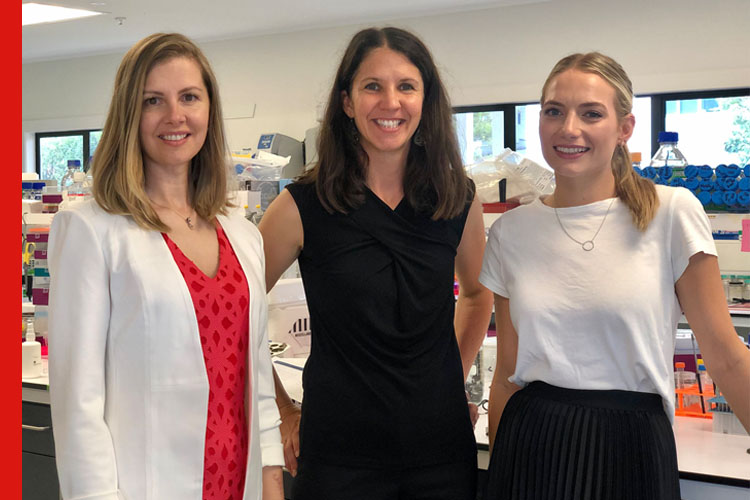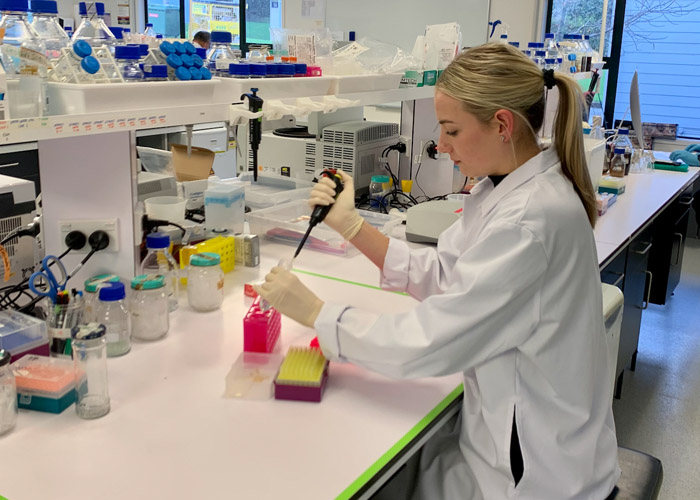
The Daisy Lab Team (L to R): Irina Miller, Dr Nikki Freed & Emily McIsaac
It may sound like science fiction, but we might soon be living in a world where not all dairy comes from cows.
New start-up Daisy Lab, recently funded by the Westpac NZ Government Innovation Fund, are currently working on using precision fermentation to enable production of a protein identical to dairy.
Their aim isn’t to make the product simply vegan-friendly, but traditional-dairy-consumer-friendly as well.
Daisy Lab Co-Founder and CEO Irina Miller explains how a small burning question turned into a dream, and then eventually a reality.
Daisy Lab born of “frustration”:
Irina said Daisy Lab was born after a stint in the dairy industry made her question the ways in which dairy was produced. She believed that with the available technology, dairy would soon be produced without animals.
With companies overseas making big moves in the space, she found it hard to believe that New Zealand was being left behind. Out of “frustration” she decided to take it upon herself and start Daisy Lab.
Irina said in a country heavily reliant on the dairy industry, they have encountered a great deal of scepticism that resists change to existing methods.
“I actually think it’s emotional and it’s scary. And it’s easy for people to disregard it and say it’ll never happen and that it’s just a fad,” she said.
But the scepticism hasn’t stopped her or her team of scientists from pursuing their vision.
“The technology of precision fermentation, it has proven that it can be scaled…To what extent it will take off, we don’t know…But it has the potential to really take off and do what we do as a country a lot closer to markets, a lot cheaper, without any animals involved, and more sustainably.”
We’re working with the dairy industry, not against them:
While most research reports about precision fermentation talk about the imminent and revolutionary takeover of the dairy industry, Daisy Lab has no such plans.
“We have a huge industry. People’s livelihoods depend on it. People have mortgages; this industry cannot be changed and should not be changed overnight. But we do have to think about diversification, and that’s going to be a process,” Irina said.
“I made my decision, I am not buying meat and dairy products, but it’s not a decision that everyone will make and it’s not a decision that we should really impose on others, because really, it’s a system that’s working. If you change it overnight, it’s going to collapse.”
Given the scale of the dairy industry, farmers do not have much to worry about for the next ten years. However, she believes they should start thinking about possibly diversifying to artisanal dairy products.
She’s hopeful that ‘dairy brewing’, as she likes to call it, will catch on as a new production method.
“Once this technology is developed, it isn’t much harder than brewing beer…because it happens in the fermenter. So why couldn’t it be an option?”
Irina said the future of precision fermentation is bright.
“The first initial host that we’re going to create, it’s only a starting point. And then you start thinking…Are there any other things that we can improve to produce higher yields?”
Daisy Lab is currently in the research stage. They began their research with casein protein and have now started looking into whey protein.
“It’s like a pipeline and the team is trying different ways of getting the DNA into the microbe,” Irina said.
Once the microbe can produce the whey and casein proteins, the door will be opened to produce dairy without animals.

Emily pipetting
It was all about starting the conversation and doing it right:
Even though Irina knew what she needed to do, she did not know where to start. What she did know was how to find the right people for the job.
“One thing I do well is finding good people. And I think because I am so passionate about the idea, eventually other people who were also as passionate, kind of stuck,” Irina said.
Irina joked about how her background in HR helped her draft a good job description, which led her to Nikki, the scientific brain behind the project, joining the team.
Another conscious choice they made while hiring was to sponsor a PhD or Masters student researcher, which is how they found Emily. The benefit of doing this, she said, was that they were able to continue researching while being self-funded.
With Nikki and Emily on board, Daisy Lab was able to start the conversation.
“We started talking to authorities and realised there’s some investor interest. We realised that all the things that people say about why you can’t do it in New Zealand, some are untrue, some are maybe true, but you can still work through most of them,” Irina said.
Her search for a team helped her find some extremely talented people, many of whom volunteer their time, simply for the sake of being involved in this innovate project.
“We are humbled. We do come across people…we can’t hire just yet, but we have a lot of consulting agreement. It’s amazingly flattering,” said Irina.
The Westpac NZ Government Innovation Fund has come at a great time:
Amongst the infinite number of challenges that a start-up faces, funding is definitely the most testing one.
So, when Dairy Lab was made aware of the Westpac Government Innovation Fund, they immediately applied with only 48 hours left for the deadline.
Irina said the guidance they received from the Fund helped them move onto the next stage and opened up a lot of doors.
“Currently, investment markets are being quite volatile, so seed funding is a lot scarcer. We are now starting to raise our seed fund and it’s a lot harder now than it was in March or April, but we just weren’t ready to raise more money then.”
Even though they received a few investment offers early on, Irina said accepting that money would have been counterproductive.
“We had no one in the lab, we only had our two scientists start in March. Some investors were offering more money back in January, but it’s actually counterproductive. If you put 10 people in a lab straightaway, you’re not going to get better results than if you put two.”
Given the financial hurdles, she said the grant came at a great time.
“It’s going to help us hire at least one other person and extend our research,” she said.
